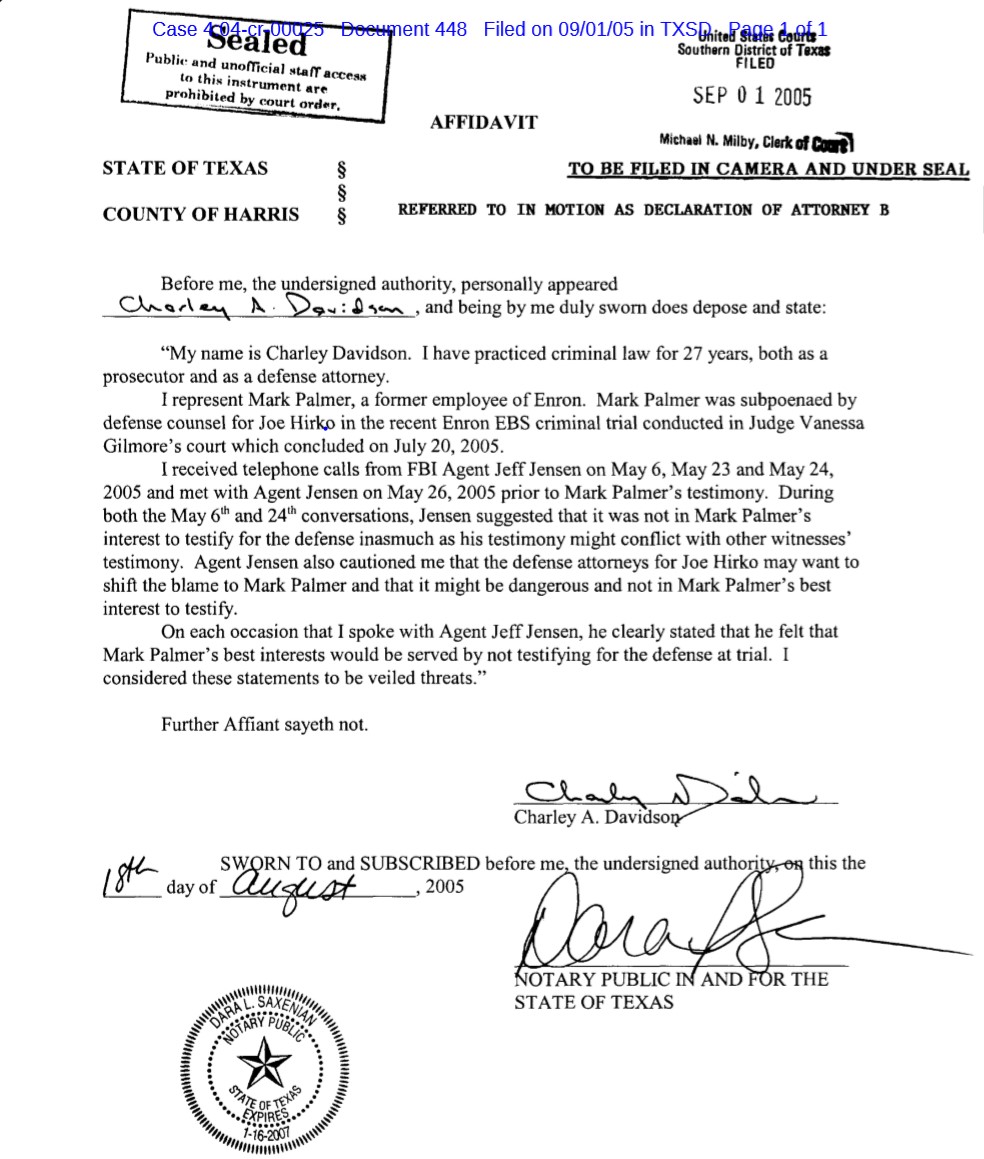The dictionary definition of self-righteousness is “confidence in one’s own righteousness, especially when smugly moralistic and intolerant of the opinions and behavior of others.” Bionically speaking, self-righteousness, which is related to legalism, is the idea that we can somehow generate within ourselves a righteousness that will be acceptable to God (Romans 3:10). Although any serious Christian would recognize the error of this thought, because of our sin nature, it is a constant temptation to all of us to believe we are, or can be, righteous in and of ourselves. In the New Testament, Jesus and the apostle Paul came down particularly hard on those who attempted to live in self-righteousness.

The sealed records involved the Enron case Weissmann oversaw prior to his abrupt departure from the Enron Task Force in the middle of jury deliberations. Given Weissmann’s current role as Mueller’s “pit bull,” revisiting the allegations of misconduct leveled against the prosecutor—with the benefit of the entire unsealed record—promotes transparency and the public’s interest in trusting the integrity of the special counsel’s team.
His name is Andrew Weissmann.
On paper, his credentials are impressive. But his actions over the years have manipulated the legal system, misled jurists, intimidated innocent people, and led the Special Counsel team in an unprecedented effort to remove a president. I’d like to give you some background on Weissmann, and also learn from all of you if there is any way to hold him to account after all this time.
First, it was no secret that Andrew Weissmann had a reputation for no-holds-barred efforts as a prosecutor. He ran high-profile cases involving New York’s mob bosses from the US attorney’s office for the Eastern District of New York, 2001-2002. Christopher Wray praised him when he was selected to direct the Enron case, 2002-2005. His history with Bob Mueller was at the FBI, and he left for private practice in 2005. He went to work under Mueller again as General Counsel in 2011, and headed the criminal fraud section of the DOJ in 2011.
The now unsealed records expose efforts by Weissmann, and the Enron Task Force he led, to intimidate witnesses and to interfere in the attorney-client relationship of a cooperating witness. Several affidavits unsealed last week catalogued veiled threats made to witnesses the Enron defendants sought to interview. However, because many of the attorneys would speak only off the record to Enron’s attorneys, the courts refused to consider the affidavits sufficient to prove prosecutorial misconduct.
Two attorneys, however, were willing to testify. In a just-unsealed affidavit, one lawyer stated that an FBI agent working for the Enron Task Force overseen by Weissmann warned his client against talking to the Enron defense team because “those are bad guys.” The second attorney stated that an FBI agent had made veiled threats against his client in a separate Enron trial.

Still more troubling, though, was an email Weissmann sent to William Dolan, one of the two attorneys representing a cooperating witness, Ken Rice, concerning Rice’s second attorney, Dan Cogdell. Weissmann’s email accused Cogdell of having a conflict of interest because Cogdell was seen talking with another defense lawyer. In the email, Weissmann suggested Cogdell’s supposed conflict left Rice two options: “instructs his lawyers who they can speak to and who they cannot;” [or] determine[] that his attorney has not acted in Rice’s best interests and gets rid of him.” Source
As you can see, Weissmann and Mueller had plenty of time to get to know each other; that’s probably one reason that Mueller hired him for the Special Counsel team in June 2017. Weissmann was referred to as the “pitbull.” We’ll return to his most recent work for Mueller after we review his questionable prosecutorial history.
Weissman headed three task forces that would demonstrate his ruthless and in some cases, disturbing behavior. The first was Enron. Without reviewing the history of that case, Margot Cleveland of The Federalist discoveredthe following, after she was successful in having some of the documents from that case unsealed:
The now unsealed records expose efforts by Weissmann, and the Enron Task Force he led, to intimidate witnesses and to interfere in the attorney-client relationship of a cooperating witness. Several affidavits unsealed last week catalogued veiled threats made to witnesses the Enron defendants sought to interview. However, because many of the attorneys would speak only off the record to Enron’s attorneys, the courts refused to consider the affidavits sufficient to prove prosecutorial misconduct.
She added the following:
In addition to Weissmann’s inappropriate attempt to push [Dan] Cogdell off the case, a 17-page report unsealed on Thursday by expert witness Michael Tigar detailed many more vagrancies. Especially troubling to Tigar was the Enron Task Force’s use of ‘multiple grand juries working over several years’ not to ‘return fresh indictments or start new cases, but to make the threat of indictment real and tangible’ to the nearly 90 unindicted co-conspirators.
The case against Arthur Andersen is another example of Weissmann’s destructive behavior. He ruined Arthur Andersen, with 85,000 employees worldwide. Convicted at trial, a fatally damaged Andersen appealed. The Supreme Court eventually took the case. In 2005, the nation’s highest court overturned the conviction in a 9-0 opinion.
In the Merrill Lynch case, Weissmann sent four Merrill Lynch executives to prison for a year:
Weissmann creatively criminalized a business transaction between Merrill Lynch and Enron. Weissmann’s team made sure they did not even get bail pending their appeals, even though the charges Weissmann concocted, like those against Andersen, were literally unprecedented.
Weissmann’s prosecution devastated the lives and families of the Merrill executives, causing enormous defense costs, unimaginable stress, and torturous prison time. The 5th Circuit Court of Appeals reversed the conspiracy and wire fraud rulings of the case.
Although there were grumblings about Mueller hiring Weissmann, he became of high-profile interest when Judicial Watch received an email sent from Weissmann to Sally Yates, when she refused to carry out President Trump’s travel ban. Weissman wrote: “I am so proud. And in awe. Thank you so much. All my deepest respects.” Weissmann was also reported to have been at a Hillary Clinton election night party; clearly, people had reason to wonder if he was going to participate in the Mueller team without a partisan agenda.
Later public events validated people’s concerns: Weissmann ordered a pre-dawn raid by the FBI on Manafort’s home in Virginia, and the raid lasted for hours. When Manafort was put in prison, he was in solitary confinement for 23 hours per day; it’s unclear whether his sentence, which was reduced to 47 months instead of the recommended 19 to 24 years, will continue to keep him in solitary. (It was reported that the decision to keep him in solitary was to ensure his safety.)
In spite of all these questionable actions, Weissmann never was called to account, as far as the public knows. I have no way of determining if he only bent rules or broke them, or acted unethically. But he certainly ruined many lives, multiple times, and has never been held to account. For those of you who practice law, is there no recourse? Is there a chance that AG Barr will discover that Weissmann broke the law? If so, will Barr take action against Weissmann, now that he has left the government?
Weissmann also destroyed the former accounting giant Arthur Andersen by pushing a phony criminal case. The Supreme Court eventually overturned it unanimously, but only years later, after the damage had been done.
Given Weissmann’s past, as demonstrated by the recently unsealed court documents, and the politically charged nature of the special counsel’s investigation, Mueller would have been wise to have selected individuals beyond reproach for his team. And that is clearly not Weissmann.
Andrew Weissmann left the Mueller team in March 2019. He is expected to work at New York University School of Law.Source
Maybe he’ll be teaching ethics.
Paul’s treatment of self-righteousness is no less scathing than Jesus’ was. He began his great argument in Romans for the grace of God by condemning the Jews’ self-righteous trust in circumcision (Romans 2:17–24). He follows that up in chapter 10, saying that the Jews tried to gain acceptance with God based on their own righteousness, demonstrating ignorance of the true righteousness of God (Romans 10:3). His conclusion is that Christ is the end of the law for righteousness, not man (verse 4).
StevieRay Hansen
Editor, Bankster Crime
MY MISSION IS NOT TO CONVINCE YOU, ONLY TO INFORM…
#Fraud #Banks #Money #Corruption #Bankers
![]()





Surprising that a POS like Weissmann hasn’t been murdered in cold blood by the people he has screwed over.
You seem to forget that there are grand juries that hear evidence and issue indictments; courts that vet charges, evidence and jury instructions; trial juries that hear evidence and make decisions whether to convict; and defense attorneys who zealously represent the defendants’ interests. Andrew Weissman didn’t get those convictions all by himself. You can demonize a single prosecutor all you want. But these charges didn’t go to trial and result in convictions just because of Weissman.